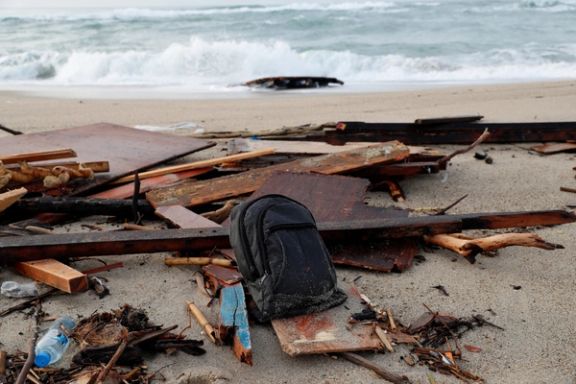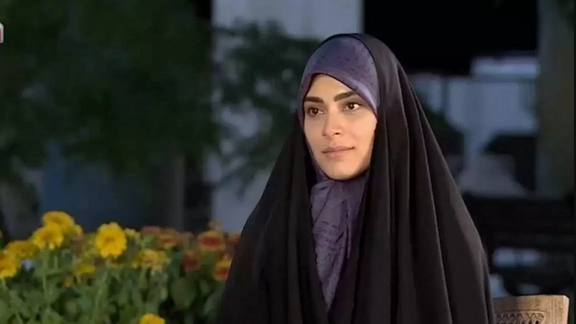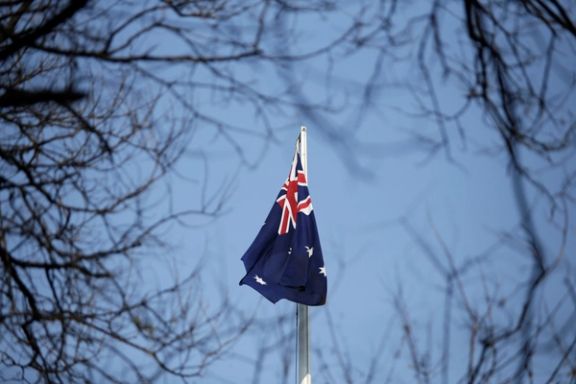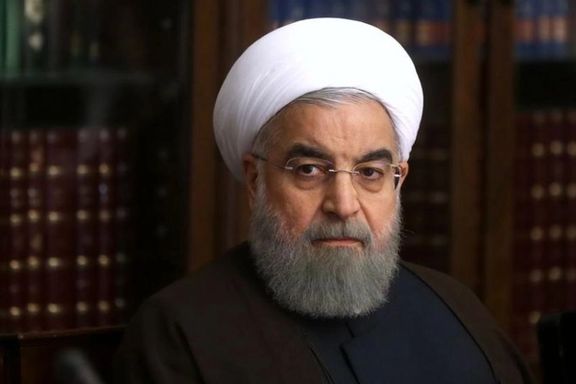Iranian Nationals Among Victims of Italy Migrant Boat Capsize

The Embassy of the Islamic Republic in Rome has confirmed that Iranian nationals were among those who perished when a migrant sailboat capsized in the Mediterranean on June 16.

The Embassy of the Islamic Republic in Rome has confirmed that Iranian nationals were among those who perished when a migrant sailboat capsized in the Mediterranean on June 16.
Mitra Ghasem Karimi, whose brother and sister are among those missing, informed Iran International that the families of the others are independently attempting to hire helicopters to search for their relatives.
The vessel had departed from Turkey approximately eight days prior with around 75 individuals from Iran, Syria, and Iraq on board, according to reports from the UN refugee agency and other UN organizations.
The Italian coastguard has recovered 20 bodies from a weekend shipwreck in the Ionian Sea off the southern Italian coastline, with dozens more missing and presumed dead.
Survivors, according to the AP, recounted that the boat's engine caught fire overnight on Sunday, leading to its capsizing off the Italian coast.
The fatalities mark a total exceeding 800 individuals who have perished or gone missing and are presumed deceased while attempting to cross the central Mediterranean this year alone, amounting to an average of five deaths per day, according to reports from UN agencies.
Iranians, known for their extensive history of emigration, primarily since the 1979 revolution, represent a significant portion of migrants embarking on perilous journeys across the English Channel to reach the UK and across the Mediterranean Sea to Europe.

Parliament speaker and presidential candidate Mohammad Bagher Ghalibaf has faced renewed public backlash as further revelations surface about a scandal involving his family's trip to Turkey.
Dubbed "layette-gate" in 2022, Ghalibaf was embroiled in controversy when his wife, daughter, and son-in-law returned from a trip to Turkey with substantial excess luggage, reportedly including items such as a baby bed and stroller readily available in Tehran.
Critics levied accusations of hypocrisy against Ghalibaf, pointing out discrepancies between his public rhetoric advocating support for domestic products and patience during the country's worst economic crisis while simultaneously allowing his family to travel abroad to purchase luxury goods.
As her father now vies for the presidency in the upcoming June 28 elections, on Tuesday, his daughter Maryam made a televised attempt to clear her family's name, but instead, the public's outrage against Ghalibaf only intensified.
She admitted to her trip to Turkey but vehemently denied the purpose, stating, "I did travel to Turkey, but not to buy layette." In a bid to clear her father's name, she said, "They were unable to criticize him directly, so they fabricated falsehoods about his family."
The saga in 2022 was worsened after the revelation of a video from the 2017 presidential debates showing Ghalibaf admonishing a former minister for traveling to Italy to purchase baby clothes, asserting bleakly, "You think our economy will improve, but it never will!"

Civil activist Vahid Ashtari, who initially disclosed details of the trip, responded to Ghalibaf's daughter's appeal on Wednesday by sharing airport documents purportedly indicating they were carrying 294 kilograms of luggage.
“Mr. Ghalibaf's daughter said on TV that she went to Turkey, but not for shopping. Here is the image from the Meraj Airlines system that I am sharing for the first time. They should clarify what these 294 kilograms of baggage registered under her husband’s name contained - 20 packages and luggage!” Ashtari wrote on X.
In the interview, Ghalibaf’s daughter also stated that those who fabricated lies about her had been punished. However, Ashtari shared a document purportedly indicating his acquittal in the "layette-gate" case.
Meanwhile, the IRGC-linked Tasnim News Agency attempted to vindicate Ghalibaf in response to Ashtari's tweet by posting an image, purportedly released by Meraj Airlines, "refuting false rumors about the weight of Ghalibaf's family luggage" and indicating potential "judicial action against these allegations."
The combined weight of the luggage depicted in Tasnim's image for the family amounts to approximately 130 kilograms, a detail that prompted some users to argue that it is still a substantial amount.
It is not the first time Ghalibaf's daughter has been at the center of scandal. In 2016, the Memari News website, owned by prominent whistleblower Yashar Soltani, reported that Lavizan Park in Tehran had been closed for several days for her wedding celebration while her father was mayor of Tehran.
Memari News detailed how the municipal forces of Tehran's fourth district were on alert for the wedding, utilizing municipal resources to illuminate Lavizan Forest Park at the cost of local authorities.
In Tuesday's television interview, Ghalibaf's daughter also denied the allegations as false, stating, "These lies ruined our wedding celebration."
In 2019, Soltani was imprisoned for exposing financial corruption within the Tehran Municipality during Mohammad Bagher Ghalibaf's tenure and for revealing details about the wedding. Earlier this month, Soltani was rearrested for his reporting on corruption.
Back in 2022, a leaked audio file of IRGC commanders discussing extensive financial corruption involving Ghalibaf during his tenure as Tehran mayor also caused an uproar in Iran, reflecting the deep connections between the IRGC and the country's political echelons.

Iran's Minister of Information and Communications Technology has refuted presidential candidates' promises to lift internet censorship in Iran, stating that the president does not have the authority to make that decision.
"Those advocating for the removal of internet filtering should recognize that such decisions are often determined in meetings where government consensus does not necessarily align with majority opinion," said Issa Zarepour, referring to the power security and intelligence organs wield in suppression of information.
He further elaborated, "When making such promises, it's crucial to ensure they can be fulfilled later on. In the previous administrations, filters were enforced on platforms like Viber, WeChat, Telegram, and Twitter. No one can claim they didn't enforce these measures during their tenure."
His refutation appears to address Mostafa Pourmohammadi's recent presidential campaign pledge to remove internet filtering.
"I aim to swiftly eliminate VPNs and filtering due to their adverse security implications and the costs imposed on our nation," Pour Mohammadi, a former justice minister, stated.
Over the past two decades, Iran has implemented extensive censorship measures, blocking tens of thousands of websites. With the rise of social media, platforms like Facebook, Twitter, and YouTube have also been subject to restrictions. Traditional media, books, and films are similarly heavily censored and scrutinized for both adherence to Islamic beliefs and political content.
In circumventing website restrictions and evading filters, individuals utilize VPNs to gain unrestricted access to the Internet. In freer societies, VPNs are predominantly employed to safeguard user anonymity.

The terrorist organization framework within Australia’s Criminal Code does not allow for the listing of the Islamic Revolutionary Guard Corps (IRGC), an Australian official told Iran International.
“The Australian Government has used the tools available to it to take meaningful action against the IRGC, including through the imposition of targeted financial sanctions,” an Australia's Department of Foreign Affairs spokesman told Iran International's Alireza Mohebbi.
“The Government has sanctioned more than 80 IRGC-linked individuals and entities since Iran’s violent suppression of protests in September 2022, including the Commander of the IRGC Quds Force and the IRGC Navy,” the official further explained.
Following Canada's government decision on Wednesday, Australia is facing increasing pressure to follow suit as Australian senators and rights groups have rebuked their government's reluctance to take similar action.
"The Canadian Government's decisive action contrasts sharply with the inaction of the Albanese Government, which has failed to designate the IRGC as a terrorist organization in Australia," read a joint statement by lawmakers Claire Chandler, Simon Birmingham, and James Paterson.
Australian-Iranian rights group Ausiran urged Foreign Minister Penny Wong to acknowledge IRGC's role in terrorism, citing threats to global security and Australian citizens.
"Ausiran calls on the Government to prioritize Australian citizens' safety and global peace by joining allies in designating the IRGC as a terrorist organization," the letter emphasized.
The Australian Jewish Association (AJA) reiterated its call for IRGC designation, citing its global terrorist activities, including recent plots against Jewish and Israeli targets.
"The IRGC is the largest sponsor and facilitator of terrorism worldwide, impacting victims from Yemen to Ukraine. They coordinate hostility against Israel," stated AJA CEO Robert Gregory. "Their actions result in casualties among our allies, including US soldiers in the Middle East, while they oppress and imprison the Iranian people."
Kylie Moore-Gilbert, a former detainee in Iran, also joined the call for Australia to designate the IRGC as a terrorist organization, asserting, "Australia has no more excuses." She argued that since the US and Canada have taken such steps, Australia should follow suit to address the plight of "thousands of Iranian Australians and other victims of IRGC terror."
Moore-Gilbert was arrested by the IRGC in 2018 and sentenced on espionage charges before being released in a 2020 prisoner exchange.

Iran is grappling with a severe energy deficit crisis, exacerbated by the summer heat and the government's failure to meet natural gas and electricity production targets.
Recently, Iran's Deputy Minister of Industry, Mines and Trade announced drastic measures, revealing that electricity supply to the industrial sector will be halved during the summer months.
In a letter addressed to the government, Reza Mohtashmipour highlighted significant shortages. The steel manufacturing sector, demanding 5,500 MW, will receive only 2,400 to 3,800 MW. Similarly, the cement industry, requiring 1,000 MW, will be allocated just 500 to 650 MW.
Before delving into Iran's electricity deficit situation, it's crucial to note an error in Mohtashmipour's official letter where units were incorrectly stated as "Watt hour" instead of "Watt". This elementary error reveals the often criticized lack of expert knowledge among top officials and their assistants.
For example, he erroneously indicated that the steel manufacturing sector requires "5,500 MWh power". However, the correct unit is watt, not watt hour. If we measure the steel sector's electricity need based on watt hour, it is approximately 45 million MWh annually, 3.75 million MWh monthly, or 120,000 MWh per day.
Power deficit
Although the nominal capacity of Iran's power plants is 90,000 MW, many of these plants have been worn out for years. To inflate the numbers, Iranian officials include decommissioned power plants in the statistics for nominal power generation capacity.
According to the statistics of the Ministry of Energy, the "actual" power generation capacity is about 75,000 MW. In addition to worn out and decommissioned fossil fuel power plants, the country's hydropower plants have generated electricity less than the nominal capacity due to the drought. The shortfall peaks at 14,000 MW or 20% during summer.
Despite government plans to launch over 6,000 MW of new power plants last year, only a fraction materialized (about 30%), underscoring persistent challenges. This summer, the government has adjusted the working hours of the public sector and implemented electricity cuts in dozens of offices due to high electricity consumption from cooling systems.
It's notable that the government bureaucracy consumes only 2,000 MW of electricity even at peak demand using all cooling systems, representing just 3% of the country's total electricity demand. Even if the entire public sector, including offices, banks, hospitals, schools, and universities, were closed and street lighting completely cut off, it would only mitigate half of Iran's summer electricity deficit.
According to statistics from the Ministry of Energy, Iran's electricity consumption is distributed as follows: public and road lighting sector 10%, household sector 32%, industrial sector 36%, agriculture 14.5%, and commercial sector 7.5%.
World Bank estimates
The World Bank recently reported a slowdown in Iran's GDP growth, projecting moderation for the fiscal years March 2024-March 2025. This is attributed to subdued global demand, ongoing international sanctions, and domestic energy shortages, which exacerbate Iran's severe electricity deficit in summers and substantial gas deficit in winters.
To prioritize residential energy needs, the government has imposed limits on energy supplies to the industrial sector, causing annual losses estimated at $6-8 billion. The International Monetary Fund also forecasts continuous GDP deceleration in Iran between 2024 and 2026.
Instead of addressing the fundamental energy imbalance, authorities have resorted to cutting off electricity and gas to industries—a short-term solution that fails to resolve the country's energy deficit.
Official statistics reveal that 13% of Iran's generated electricity is lost during transmission and distribution due to an outdated grid. This is equivalent to the total electricity consumption of the steel industry, which generates export revenues. Moreover, many of Iran's power plants are inefficient gas or steam types. Rather than modernizing the grid or converting to more efficient combined-cycle plants, the government has opted for measures like adjusting office hours or imposing restrictions on industrial power supply.
Iran boasts ideal conditions for solar energy production, with 300 sunny days annually, yet renewables contribute only 1% to the country's electricity generation. Last year, the government aimed to launch 2,800 MW of solar and wind power plants but achieved only 2% of the target.
Compounding these challenges is the government's burgeoning debt to private power plants, now amounting to 900 trillion rials ($1.5 billion), a 300% increase since 2021, which has become a significant crisis.

Iran's former president Hassan Rouhani has demanded airtime on Iranian state television for the second time this week to address what he says are "accusations" against him by some presidential debates.
Drawing from Supreme Leader Ali Khamenei's earlier call for contenders to avoid "slander and refrain from smearing each other," Rouhani's office asserted that these actions have been directed towards him.
During debates, conservative candidates frequently criticized Rouhani's 'reformist' tenure, with Alireza Zakani, Tehran's Mayor and a presidential candidate, remarking, "Rouhani's eight-year tenure was a dark era that worsened the country's situation."
His letter, cited by Iranian media, criticized certain candidates for allegedly “flouting moral and legal standards”, urging the Islamic Republic of Iran Broadcasting (IRIB) to “honor its commitment to provide equitable airtime”.
Hardliners have been accusing Rouhani for Iran's current economic crisis that worsened after the United States withdrew from the 2015 nuclear deal six years ago and imposed economic sanctions.
The former president also lodged a complaint following the broadcast of the first debate on Monday.
After his initial complaint, IRIB urged Rouhani to clarify the precise nature of the allegations and specify when they were made during the debates. Despite this, his subsequent complaint, like the first, lacked specific details.